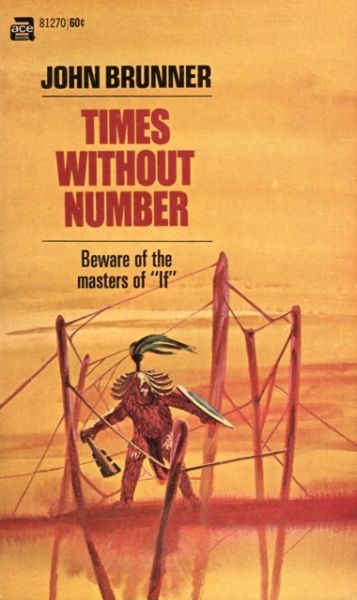Save Every Day
Times Without Number
By John Brunner

31 Jan, 2023
John Brunner’s Times Without Number is a collection of time travel stories later re-published as a fix-up. For reasons that will become clear, assigning this work a publication year is not straightforward. This review is of the 1969 edition.
Four hundred years after the Spanish Armada gathered Britain safely back into the arms of the Church, Spain fell to Muslim armies. The Spanish monarchy retreated to Britain. It still governs an expansive empire, stretching from the former France to the New World. Peace and prosperity reign, save perhaps for peasants and slaves … and really, who cares about them?
Thanks to genius Carlo Borromeo, Imperial might can now reach back through time. The empire is not the only power with time travel. Eastern Europe’s Confederacy also possesses it, perhaps because Borromeo gave them his invention so that a single power wouldn’t have a monopoly on time travel.
The Treaty of Prague, negotiated between the two time-travel powers, limits abuses. Carefully regulated time travel has been an accepted part of life for nearly a century.
All things end. In this case, things fall apart in three collected stories. To wit:
Spoil of Yesterday • [The Society of Time • 1] • (1962)
Society of Time agent Don Miguel Navarro is distracted from the exquisitely tedious party to which he foolishly accepted an invitation when he realizes that the mask displayed by his hostess1 must have been illicitly stolen from the past. The mask being top quality work, it must have been well known in its time; the theft could threaten history itself.
The investigation that follows swiftly hits a wall. Navarro easily determines the mask’s origin and its most recent owners. Uncovering the criminal who stole the mask proves more difficult, as the miscreant has gone to extremes to conceal their identity.
The Word Not Written • [The Society of Time • 2] • (1962)
Attending yet another unfortunate party, Navarro sneaks away from the festivities in the company of the alluring Lady Kristina. They happen upon a young woman in peculiar clothes who is in the process of beating up a group of would-be rapists. Thanks to leaving the party, Navarro and Kristina escape the attack that claims the lives of the royal family and all others in attendance at the party.
Despite the bloodshed, all is not lost. All the Society needs to do is alter recent events ever so slightly and the massacre will never have occurred. To which alteration the Society agrees. Clear proof that the Society does not in fact see history as inviolate. An alarmed Navarro begins to realize that when regulated by fallible humans, time travel places all of history at risk.
The Fullness of Time• [The Society of Time • 3] • (1962)
The discovery of a modern machine part in an old Californian mine reveals that some modern malefactor has illegally mined New World resources by means of time travel. The obvious culprit? The Eastern European Confederacy, which lacks easily accessible resources. All that remains is for the Society of Time to confront the culprits and convince them to stop.
Navarro discovers too late that he and his colleagues have misunderstood the nature of the threat. Many subjugated peoples resent their conquest by the Spanish empire and their colonial catspaws. The mine is but one small part of one man’s campaign to liberate his people, no matter the cost.
~oOo~
These stories first appeared as individual pieces in 1962; in abridged form in a 1962 collection; in a somewhat expanded edition in 1969 (the version I currently own); and an even longer version in 1974 (which I used to own).
Brunner resists the temptation to make his protagonist a man who inexplicably holds beliefs and attitudes more typical of 20th century Britain. Despite his growing qualms about the uses to which time travel is put, Navarro accepts his world as a right and proper one. Any vaguely liberal pretensions he has vanish as soon as they might cause personal inconvenience.
There is an unwritten rule in alternate universe stories that if a discussion of the Jonbar point that divides the narrative universe from ours can possibly be shoehorned into the narrative, it will be. Time does not disappoint. The matter of the Armada is raised very early in the book. It’s quite remarkable how people always know what divides their world from ours, even when they have no idea our history exists.
Brunner was originally writing these stories for magazine publication; he was forced to ruthless efficiency. This efficiency hints at the changes that will not be important to the plot (not covered in any detail) and those that will be important (given detailed treatment). Not much on the Muslim conquest of Spain and a lot of words on the Armada.
To place this work in the context of Brunner’s long career: his fix-up is vastly superior to another early Brunner novel, Galactic Storm. It’s hard to believe that Storm and Timewere written by the same author. Time is also an improvement over Catch a Falling Star, because the protagonist’s actions actually matter.
This fix-up was published early in Brunner’s career; he was to write much better books later.
Times Without Number is available here (Amazon US), here (Amazon Canada), here (Amazon UK), here (Barnes & Noble), and here (Chapters-Indigo).
I did not find Times Without Number at Book Depository, possibly because Times is available only in ebook form, which Book Depository does not sell.
1: The hostess of the unfortunate party is shown to be a shallow poseur: she supports the movement for increased civil liberties but mistreats her slaves.
